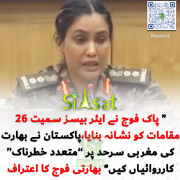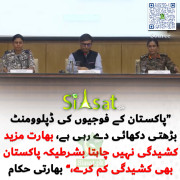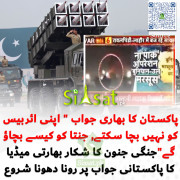C
commander
Guest
Judgment leaves NRO beneficiaries nervous
http://www.thenews.com.pk/top_story_detail.asp?Id=23610
Saturday, August 01, 2009
News Analysis
By Shaheen Sehbai
WASHINGTON: The Supreme Court of Pakistan has, as expected, set the stage for far-reaching judicial, legal and political changes in the country with its landmark judgment on Friday night in the PCO judges case.
Some parts of the judgment are clear and categorical and an attempt has been made not to rock the boat and destabilise the present set-up but the window for selective decisions later has been kept wide open.
For instance while President Zardaris oath given by Chief Justice Dogar has been accepted as valid, because that would have caused a sudden collapse of the system, the whole career of Justice Dogar during the Nov 3 emergency has been invalidated. This could be described as a political balancing act of a very dangerous kind.
The key issue of whether the NRO has been protected and whether the beneficiaries of NRO still remain protected has been left in a cloud of legal interpretations and uncertainty. Some very weighty legal opinions that have come after the judgment say the NRO is gone but others say it is not yet clear.
Many legal experts have been quoted as saying President Zardari is protected under the immunity he enjoys as the head of state but others say if the NRO is struck down as an invalid and bad law, the benefits of the NRO would also go away no matter who currently enjoys them.
In short, while the Supreme Court has held General Pervez Musharraf accountable for all he did on Nov 3, 2007 and afterwards, punishing all his collaborators, some hints have been given that the issue of holding accountable those who resisted the restoration of judges after the Feb 08 elections, is still open and may be tackled later.
The whole situation is in no way a happy development for the government and the president because he is the only one who has to worry about the implications of this judgment. All others are more than happy and jumping with joy. General Musharraf is history and beating a dead horse has always been easy for the judiciary. But this judiciary is trying to prove that it may not just be satisfied with burying dead bodies but may want its own alive victims as well.
Yet it is easier said than done. Even if, in the worst case scenario for President Zardari, the NRO is struck down and its beneficiaries are deprived of the benefits, the only thing that could happen would be that the old unproven cases against the beneficiaries would reopen but they would have to be pursued by the sitting government, which is being run by these very beneficiaries.
So while these victims may not be interested in pursuing their own cases, the burden would again fall on opponents who may throw these cases into the lap of the judges for their verdicts. That could take time.
But this would be the legal position. The moral and ethical pressure that would come with the removal of the NRO would be more damaging and it would be a part of CV for any sitting president if it includes cases of corruption, though still undecided.
The impact of other parts of the judgment would be immense as all PCO judges are destined to revert to their old jobs or go home, the Islamabad High Court will close shop, even the additional newly inducted Supreme Court judges, who were part of the PPP strategy to beat the Iftikhar Chaudhry-led SC, would lose their jobs.
A total reversal of the judicial situation before the Nov 3 position has thus been attempted. Part of this may be achieved but Justice Iftikhar Chaudhry and his colleagues will have to live with some facts, howsoever unpleasant and ugly.
The overall impact of the judgment would be positive in many ways but the sword still hangs on some of the key collaborators and supporters of General Musharraf and his policies.
The President of Pakistan also falls in this category because his actions will now be watched by the Supreme Court in the process of appointment of new replacement judges in the high courts and SC.
Thus if the president creates hurdles in induction of new judges, who will all be nominees of the SC and high court chief justices, his arms may be twisted in some other ways.
More important at this juncture would be the relief felt in the permanent establishment of Pakistan because the system as such has not been jolted enough to cause concerns. The judicial corrections and undoing the Musharraf legacy will not bother many but if the present set-up had been shaken, the concerns would have been immense.
http://www.thenews.com.pk/top_story_detail.asp?Id=23610
Saturday, August 01, 2009
News Analysis
By Shaheen Sehbai
WASHINGTON: The Supreme Court of Pakistan has, as expected, set the stage for far-reaching judicial, legal and political changes in the country with its landmark judgment on Friday night in the PCO judges case.
Some parts of the judgment are clear and categorical and an attempt has been made not to rock the boat and destabilise the present set-up but the window for selective decisions later has been kept wide open.
For instance while President Zardaris oath given by Chief Justice Dogar has been accepted as valid, because that would have caused a sudden collapse of the system, the whole career of Justice Dogar during the Nov 3 emergency has been invalidated. This could be described as a political balancing act of a very dangerous kind.
The key issue of whether the NRO has been protected and whether the beneficiaries of NRO still remain protected has been left in a cloud of legal interpretations and uncertainty. Some very weighty legal opinions that have come after the judgment say the NRO is gone but others say it is not yet clear.
Many legal experts have been quoted as saying President Zardari is protected under the immunity he enjoys as the head of state but others say if the NRO is struck down as an invalid and bad law, the benefits of the NRO would also go away no matter who currently enjoys them.
In short, while the Supreme Court has held General Pervez Musharraf accountable for all he did on Nov 3, 2007 and afterwards, punishing all his collaborators, some hints have been given that the issue of holding accountable those who resisted the restoration of judges after the Feb 08 elections, is still open and may be tackled later.
The whole situation is in no way a happy development for the government and the president because he is the only one who has to worry about the implications of this judgment. All others are more than happy and jumping with joy. General Musharraf is history and beating a dead horse has always been easy for the judiciary. But this judiciary is trying to prove that it may not just be satisfied with burying dead bodies but may want its own alive victims as well.
Yet it is easier said than done. Even if, in the worst case scenario for President Zardari, the NRO is struck down and its beneficiaries are deprived of the benefits, the only thing that could happen would be that the old unproven cases against the beneficiaries would reopen but they would have to be pursued by the sitting government, which is being run by these very beneficiaries.
So while these victims may not be interested in pursuing their own cases, the burden would again fall on opponents who may throw these cases into the lap of the judges for their verdicts. That could take time.
But this would be the legal position. The moral and ethical pressure that would come with the removal of the NRO would be more damaging and it would be a part of CV for any sitting president if it includes cases of corruption, though still undecided.
The impact of other parts of the judgment would be immense as all PCO judges are destined to revert to their old jobs or go home, the Islamabad High Court will close shop, even the additional newly inducted Supreme Court judges, who were part of the PPP strategy to beat the Iftikhar Chaudhry-led SC, would lose their jobs.
A total reversal of the judicial situation before the Nov 3 position has thus been attempted. Part of this may be achieved but Justice Iftikhar Chaudhry and his colleagues will have to live with some facts, howsoever unpleasant and ugly.
The overall impact of the judgment would be positive in many ways but the sword still hangs on some of the key collaborators and supporters of General Musharraf and his policies.
The President of Pakistan also falls in this category because his actions will now be watched by the Supreme Court in the process of appointment of new replacement judges in the high courts and SC.
Thus if the president creates hurdles in induction of new judges, who will all be nominees of the SC and high court chief justices, his arms may be twisted in some other ways.
More important at this juncture would be the relief felt in the permanent establishment of Pakistan because the system as such has not been jolted enough to cause concerns. The judicial corrections and undoing the Musharraf legacy will not bother many but if the present set-up had been shaken, the concerns would have been immense.






























